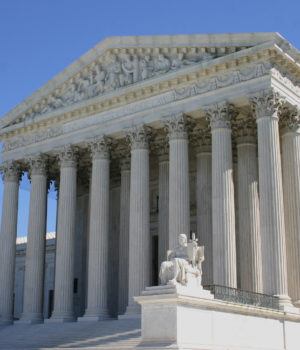Written by Joey Slusher
In a follow to the last edition of Across the Aisle, we’ll take another deep dive into what is really at stake with the open seat on the Supreme Court. As discussed, President Trump’s nominee, Amy Coney Barrett, is an originalist when it comes to judicial interpretation, and generally follows conservative judicial standards. This has brought into question whether several decisions that have been made by the Supreme Court will stand.
Such controversial decisions include, Roe v. Wade which legalized abortion nationally, Obergefell v. Hodges which was a landmark case that legalized same-sex marriage in the U.S., and the possibility that in the coming hearing on Texas v. California, the Affordable Care Act (ACA), otherwise known as Obamacare, could be declared unconstitutional.
Texas v. California is scheduled to be argued before the court on November 10th, 2020 just one week after the presidential election. This appears to be one of the driving factors behind the Republican push to confirm the president’s nominee. Amy Coney Barrett has expressed her disdain in the ACA and sits in agreement with deceased Justice Antonin Scalia that the law is not constitutional. In the past the ACA has been upheld by the courts but with a conservative majority this likely won’t be the case.
The Republican party has been attempting to do away with the law since its creation in 2010 but have never proposed an alternative healthcare plan to replace it. If the Supreme Court makes the decision that the ACA is unconstitutional, the 20 million people covered by the ACA will immediately be left uninsured as the COVID-19 crisis continues around them. This puts those millions at risk and would likely put a strain on the health of the people and economy of the United States.
As mentioned before, another case that will be at risk of being overturned with a strong conservative majority is the decision made in Obergefell v. Hodges which legalized same-sex marriage nationally in 2015.
On Monday the 5th, the Supreme Court chose not to hear the case of Kim Davis, the ex-county clerk from Kentucky who after the decision in 2015, refused to issue marriage licenses to same-sex couples. While the court denied her appeal, Justices Samuel Alito and Clarence Thomas called for new cases to be brought to the court that had clear arguments to overturn the 2015 decision.
Justice Thomas wrote in reference to the decision, it, “enables courts and governments to brand religious adherents who believe that marriage is between one man and one woman as bigots making their religious liberty concerns that much easier to dismiss.” This follows recent trends from the last session of the Supreme Court where numerous decisions tended to side with religious conservatives. If the decision was overturned, millions of same-sex couples would lose their right to marry among other consequences.
As of yet, Roe v. Wade has not been mentioned in the current session, but many experts predict the court would chip away at the rights established by that decision, as a complete overturn may be too controversial.
With this news the election coming on November 3rd is only gaining more pressure as a referendum on the country’s values.




